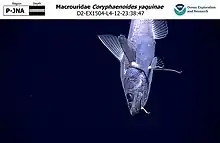Coryphaenoides yaquinae
The rough abyssal grenadier (Coryphaenoides yaquinae) is a species of deep-sea grenadier fish in the family Macrouridae. First described as a separate species in 1974, the rough abyssal grenadier was historically confused with its congener, Coryphaenoides armatus.[1] Unlike C. armatus, which has been recorded in the waters of the Atlantic, Pacific, Indian, and Southern oceans, observations of C. yaquinae have been confined exclusively to the Pacific ocean.[2] C. yaquinae tends to inhabit abyssopelagic depths between 3,400 and 5,800 meters (11,200 and 19,000 ft).[1] However, observations of C. yaquinae have been made as deep as 7,000 meters (23,000 ft) below sea level.[3]
| Coryphaenoides yaquinae | |
|---|---|
 | |
| Front half specimen collected during a dive from the Okeanos Explorer in 2015 | |
| Scientific classification | |
| Domain: | Eukaryota |
| Kingdom: | Animalia |
| Phylum: | Chordata |
| Class: | Actinopterygii |
| Order: | Gadiformes |
| Family: | Macrouridae |
| Genus: | Coryphaenoides |
| Species: | C. yaquinae |
| Binomial name | |
| Coryphaenoides yaquinae (Iwamoto & Stein, 1974) | |
Ecology
The rough abyssal grenadier is an active benthic forager, with a diet that features a variety of seafloor fauna.[4][5] Squids, crustaceans, and polychaetes comprise the most consistent sources of prey for C. yaquinae, though stomach content analyses have revealed echinoderms, fish, and food scavenged from carrion.[5]
References
- Endo, Hiromitsu; Okamura, Osamu (1992). "New records of the abyssal grenadiers Coryphaenoides armatus and C. yaquinae from the western North Pacific". ResearchGate. 38 (4): 433–437. doi:10.1007/BF02905607. S2CID 82567179.
- Jamieson, A.J.; Priede, I.G.; Craig, J. (June 2012). "Distinguishing between the abyssal macrourids Coryphaenoides yaquinae and C. armatus from in situ photography". Deep Sea Research Part I: Oceanographic Research Papers. 64: 78–85. Bibcode:2012DSRI...64...78J. doi:10.1016/j.dsr.2012.02.001. hdl:2164/5502.
- Jamieson, A. J.; Fujii, T.; Solan, M.; Matsumoto, A. K.; Bagley, P. M.; Priede, I. G. (2008-12-16). "Liparid and macrourid fishes of the hadal zone: in situ observations of activity and feeding behaviour". Proceedings of the Royal Society B: Biological Sciences. 276 (1659): 1037–1045. doi:10.1098/rspb.2008.1670. PMC 2679086. PMID 19129104.
- Priede, I. G.; Bagley, P. M.; Armstrong, J. D.; Smith, K. L.; Merrett, N. R. (June 1991). "Direct measurement of active dispersal of food-falls by deep-sea demersal fishes". Nature. 351 (6328): 647–649. Bibcode:1991Natur.351..647P. doi:10.1038/351647a0. ISSN 1476-4687. S2CID 4363287.
- Drazen, Jeffrey C.; Popp, Brian N.; Choy, C. Anela; Clemente, Tara; Forest, Lisa De; Smith, Kenneth L. (November 2008). "Bypassing the abyssal benthic food web: Macrourid diet in the eastern North Pacific inferred from stomach content and stable isotopes analyses". Limnology and Oceanography. 53 (6): 2644–2654. Bibcode:2008LimOc..53.2644D. doi:10.4319/lo.2008.53.6.2644. ISSN 0024-3590. S2CID 15800062.